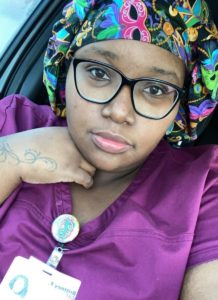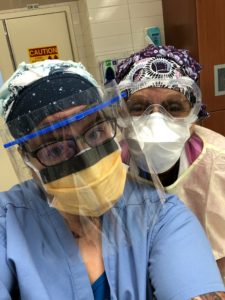To honor all of our CSTs who are such a vital part of the operating room, we interviewed two of our Surgical Techs, Britney and Laurie, to find out why they chose their career and their favorite things about it.

Britney: I chose become a Surgical Tech because of my niece. I lost my niece back in 2015. She had a HP disorder. Basically, she had, like a cleft palate, seizures and everything. And the way how they fixed her mouth, it was, like, amazing. They just fix stuff for her that gave us a few more times with her.
And like the scrub techs that was in there, they was very nice. They came and introduced themselves and they was like being very helpful. So my niece changed my whole perspective of, you know, maybe I just meant for me to do this because at first I had wanted to teach and I just realized I don’t like kids a lot.
So, let me try something different and that was a new thing and I loved it. I fell in love with it. With doing a clinical rotation, working in a hospital environment, seeing that even though you’re behind the scenes, but you making an impact on somebody’s life. That was very nice.
Laurie: So for me personally, I have was in the medical field for a very long time prior to becoming a surgical tech. I worked in the ambulance as a EMT and then I was in the E.R. as an emergency department technician. And I loved working in the E.R., but it got to a point where I felt, I don’t necessarily want to say jaded, but I just started having issues because it makes it very hard to trust people.
You start to see the most horrible things, the most horrible things people do and people will do to each other. So it got to a point where I felt like I kind of needed a change. And I never in my entire career have had the desire to be a nurse. I just haven’t. I feel like I make a very great tech.

So I looked for something that was interesting that would pay a little more. And I ended up coming across the surgical tech program that was offered through a place called American Career College. And the program wasn’t super long, so it wasn’t going to take me as long to become a surgical tech as I would have to say, become a nurse.
And it offered a pay raise, which was important. So I thought, hey, you know what? I’ll give it a try. I’ve always been fascinated with, like, blood and guts and, you know, working in the E.R.. So I went to school and I actually did really well in the course. And that’s kind of how I found out about surgical technology.
Britney: To interact with the doctors. Learning new things like you never know what service you getting every day. So for you to just do the research, only just to see hands-on experience about it is very good. So I like the experience of being in there with the doctors with my patients, even though you don’t know them after you get down because they don’t remember anything.
But just the warm feeling to know, you know, a holding their hand and everything’s going to be alright. Going to have good procedure and just the whole atmosphere in an operating room, which is very cool, laid back!
Laurie: Honestly, I love the fact that I feel like in the medical field for the longest time you’re learning about all of this stuff. You learn about the heart, you learn about, you know, the gallbladder, you learn about all of these systems, but you never get to actually see them. And it’s never really tangible. You see it in a book, you see pictures, but it’s just not the same.
And every single day, at least one point in my day, I like stop and think and I’m like, this is really my job? Like, this is what I do. For me, it was a good thing to be able to put a tangible thing to actually see what this stuff looks like and that it’s actually real. It’s not just pictures in a book.
So for me, I love actually being in it and being able to see it and be a part of it and like when we’re running the bowel, I’m just like, Oh my God, this is like the craziest thing ever.! And I love for a while I did burns, I was doing burn surgery and it just gave me a newfound love for my job because of the continuity of care.
You see some of these patients and I did a lot of vascular, so you see the same patients over and over again. And they’re so grateful for what you do and for helping them. And I feel like that just makes it all that more rewarding it’s because these people we’re actually making a difference. Whereas like, you know, in the E.R., you treat them and street them.
You don’t get to see them. You don’t get to hear their stories. This is different because, you know, given their different specialties, you actually get to learn people’s stories. And that I kind of appreciate, even though they don’t ever remember us because they get their drug cocktail before they come in. Just being a part of that and knowing that you know, I helped a little kid who was burned and is now living, you know, as normal life as they can, makes it really rewarding.
So I feel like it just makes me feel good at the end of the day, knowing that I’m able to do this.
Britney: Don’t hesitate to ask questions. You ask questions if you don’t know something, it’s good to go to one of the senior leaders. You know, hey, I have a question I’m not for sure. You have good people out there that’s willing to help. Don’t be afraid. And if you don’t know anything, if you don’t feel comfortable, speak up. I mean, a lot of CSTs now they feel like, you know, if I say something, I’m gonna get in trouble.
No, you don’t. You have a learning experience like anything. Like when you (start off) new company. Don’t be afraid. Be brave. Because when I started as a CST, I was I asked a lot of questions like, I want to know stuff. If you are interested in and you want to do it, do your research to also too about it.
Laurie: For me, honestly, it took me a while to become a traveler. I personally felt like in order to be a traveler, you need to be well versed in the different specialties and you need to be this is the biggest. You need to be okay with being the new guy over and over and over again. And me personally, I felt like it was just the right time in my career.
I’ve been a tech for six years going on seven, and I’ve barely felt this last year like I was ready to become a traveler because when I moved to Texas, I got some experience that I was missing in some specialties that I felt you really, really needed. So for a new traveler, I would say that you just need to be okay with going with the flow and going with change as a new scrub.
I feel like you’re still finding yourself out. You’re still finding out how you do things. So, I mean, I would recommend that people get some experience as a scrub tech before traveling, but that’s just my own personal opinion as a new scrub, I would say that people need to be prepared to deal with the many different personalities that are in the O.R. You know, surgeons, you hear horror stories about surgeons.
Some of them are terrible and mean. And I feel like you need to be okay with just kind of letting that bounce off you. You can’t take anything personally. And I feel like you need to have a good sense of self and of scrubbing to become a good traveler. Anybody can travel, but to be a good traveler, I feel like you need to have that kind of base, that starting point, where you’re kind of more comfortable with yourself as a scrub tech.
So I feel like that’s what’s made me a successful traveler up until this point is because I feel very confident in my skills and where I’m at as a scrub tech.